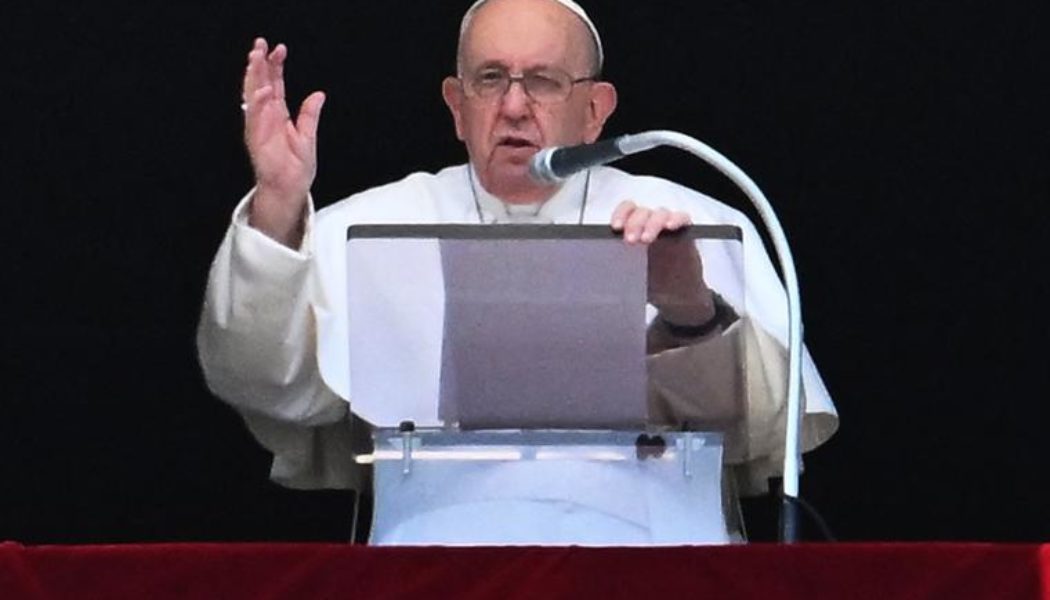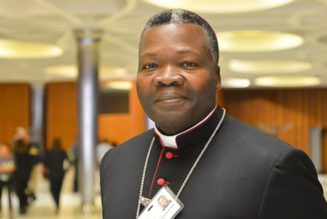
COMMENTARY: If ‘everything is connected,’ we cannot uphold the Holy Father’s teaching on respecting the integrity of creation while rejecting the givenness of our sexually-differentiated bodies.
This week marks eight years since Pope Francis promulgated his first encyclical, Laudato Si.
It’s been a time to reflect upon the prophetic insights of this teaching document, and to consider what more needs to be done to implement its call to greater care for our common home. Screenings of “The Letter,” a documentary that connects the Pope’s teaching to environmental activists carrying aspects of it out in different parts of the world, have been hosted by Catholics in an effort to spark conversation and action.
Clearly, there is much more that needs to be done in terms of implementing the moral demands that Laudato Si calls to our attention, both as individuals, as a nation, and as a global community.
But there is one perhaps unexpected moral demand grounded in Laudato Si that’s gone largely overlooked this week: the need to reject “gender theory” and its application in society, which are far more prevalent and threatening today than in 2015 when the encyclical was first published.
This isn’t to say that “gender theory” is the primary problem addressed by Laudato Si. The Pope spends far more of the encyclical addressing instances of “global environmental deterioration” — manmade climate change, rampant waste and pollution, the loss of biodiversity — and the mentality of technological domination and consumeristic exploitation of creation that underlies them.
But if “everything is connected,” as the Holy Father repeats throughout Laudato Si, you cannot claim to faithfully follow his teaching in this encyclical while ignoring or rejecting its condemnation of gender theory. You might agree with some of Laudato Si’s practical implications related to environmental policy, but at the most fundamental level, you reject the theological vision of “integral ecology” that undergirds it.
Technically speaking, Pope Francis never uses the term “gender theory” in Laudato Si — a phrase he has used innumerable times since, most recently on his visit to Hungary, where he repeated his claim that gender theory is a dangerous form of “ideological colonization.”
However, the Holy Father didn’t need to use the term to condemn what it refers to: namely, the ideological conviction that sexual differentiation is a mere social construct, not part of “the book of creation,” and that every individual “can choose his or her sex.”
In fact, perhaps the best indication that Laudato Si contains serious criticism of gender theory is that its proponents, both inside and outside of the Church, took umbrage at the encyclical as an attack on “gender reassignment” and the “transgender community” at the time of its publication.
The crucial passage is paragraph 155. Here, Pope Francis writes that “[h]uman ecology also implies another profound reality: the relationship between human life and the moral life, which is inscribed in our nature and is necessary for the creation of a more dignified environment.” He cites Pope Benedict XVI’s teaching on the “ecology of man,” grounded in the fact that “man too has a nature that he must respect and that he cannot manipulate at will,” before expanding more fully:
Learning to accept our body, to care for it and to respect its fullest meaning, is an essential element of any genuine human ecology. Also, valuing one’s own body in its femininity or masculinity is necessary if I am going to able to recognize myself in an encounter with someone who is different. In this way we can joyfully accept the specific gifts of another man or woman, the work of God the Creator, and find mutual enrichment. It is not a healthy attitude which would seek ‘to cancel out sexual difference because it no longer knows how to confront it.’
Crucially, the Holy Father’s reference to respecting the human body in its created “femininity or masculinity” is not some kind of throwaway line, a superfluous thought forced into an otherwise unrelated document on stewardship of creation. In fact, Pope Francis notes that the two are intrinsically linked:
The acceptance of our bodies as God’s gift is vital for welcoming and accepting the entire world as a gift from the Father and our common home, whereas thinking that we enjoy absolute power over our own bodies turns, often subtly, into thinking that we enjoy absolute power over creation.
Again, if “everything is connected,” it is inconsistent with Laudato Si to pick and choose which aspects of the integrity of creation to respect, upholding some while allowing others to be exploited, manipulated, and reordered according to the dictates of the technologically-empowered individual will.
Pumping toxic sludge into water sources and strip-mining the earth with indifference to the integrity of local nature and culture are of the same genus as the chemical manipulation and surgical alteration of the sexual features of the human body according to the logic of gender theory — which doesn’t enhance the integrity of the body, as real medicine does, but distorts it. In both instances, we “plunder [creation] at will.” The fact that so many ardent environmentalists, even those who claim to embrace Laudato Si, fail to see this connection is a testament to the strength of ideology, and the difficulty of holding the integrated and “broader vision of reality” called for by the Pope.
Laudato Si also provides a rebuttal to attacks on the Church’s guidance related to gender theory on the basis that it is too overly reliant upon appeals to a created order. Though Pope Francis doesn’t necessarily rely heavily on the theological categories of St. Thomas Aquinas in Laudato Si, his teaching is similarly rooted in the acknowledgment of a created order — encompassing both our common home and our sexually-differentiated bodies — to which we are called to adhere.
Sometimes Pope Francis refers to this order explicitly, as in paragraph 221, when he speaks of the need to recognize “that God created the world, writing into it an order and a dynamism that human beings have no right to ignore.” More often, he speaks of the same reality with different words, such as his frequent references to nature as a “book,” implying communication, and therefore intelligibility and order.
Because if there is no intelligible order, then there is no integrity in creation to be respected. No justice owed to “brother river and sister earth.” Any obligations to the environment and to our common home that we may have are rooted in the same created order that tells us gender theory is immoral and inconsistent with God’s plan.
Of course, this can be emphasized in the other direction, too. Our opposition to gender theory should also spur us to reject the unjust exploitation of the natural environment, such as unduly prioritizing profit or material comfort in our use of natural resources, or wasting without heed to wider environmental consequences, including those borne by the poor. Both errors are rooted in the same rejection of the created order. We cannot claim to be consistently upholding the integrity of the created order that gender theory violates if we are also not willing to pursue justice in the care for our common home. “Everything is connected.”
But the fact that some of Laudato Si’s self-proclaimed greatest proponents simultaneously go against or at least ignore the same document’s clear rejection of gender theory (not to mention abortion) is a source of great scandal, and unfortunately causes others to doubt the credibility of the calls for environmental justice they advance. Such inconsistencies are counterproductive to efforts to promote a deeper reception of Laudato Si in the Catholic community — and are contrary to the integrated witness of Pope Francis.







